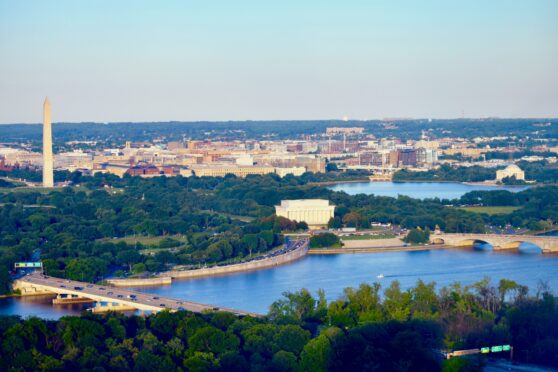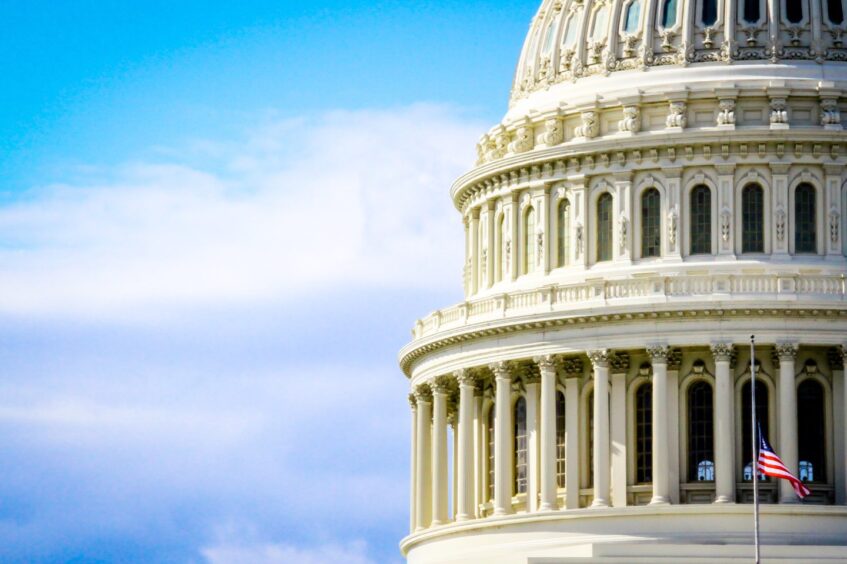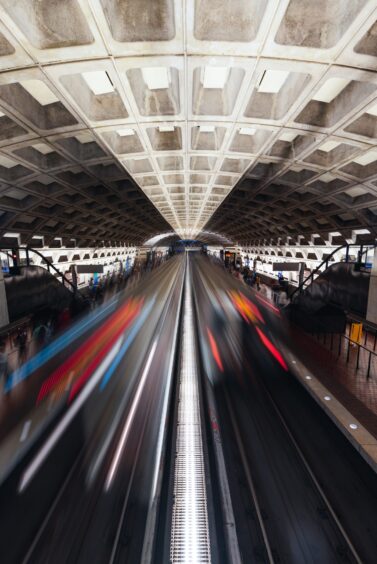
Many hotels offer a room with a view, but none quite like The Hay-Adams in Washington DC, from which you can see one of the world’s most iconic buildings, the White House.
From the rooftop of The Hay-Adams, you can get such a good view of the US president’s residence that you can actually see Secret Service counter-assault snipers changing shifts on its roof.
The five-star Italian Renaissance-style hotel is often described as Washington’s second finest address, with Barack Obama and his family choosing to stay there for a fortnight while they waited for George W Bush to leave the White House.
It’s also where I began a four-day visit to the US capital, sandwiched between an assassination attempt on Donald Trump and Joe Biden dropping out of the 2024 presidential race.
The political turmoil was the main topic of conversation in the hotel’s basement bar, Off The Record, a popular late-night spot for politicians, White House staff and journalists as well as hotel guests.
Political caricatures adorn the walls and drink coasters (one of a smiling Kamala Harris that I took home has become very prescient), and its speciality cocktails have names like Lincoln’s Ghost and Blue Wave.
But while US politics may seem particularly contentious right now, a visit to the US Capitol helps put things into perspective by showing it has always been full of drama.
The Capitol building, stormed by Trump supporters on January 6, 2021, offers fascinating guided tours, which are free though should be booked in advance.
The Exhibition Hall tells the history of Congress and its legislation, and the exhibition during my trip was Congressional Investigations.
It was particularly timely, as this year is the 50th anniversary of the Watergate scandal, which led to one of the biggest investigations by Congress.
Exhibits included Richard Nixon’s secret tape recording machine in the Oval Office and the logbook of Watergate building security guard Frank Wills, whose 1.47am call on June 17, 1972, to the police about intruders changed the course of American history.
There was even Nixon’s 17-word resignation letter to Henry Kissinger, which made him the only US president to resign from office.
Meanwhile, it’s hard not to feel a sense of awe standing under the Capitol Dome, one of the most famous buildings in the world and a symbol of American democracy, standing next to statues of past presidents and marvelling above at the ceiling fresco, The Apotheosis of Washington, by Constantino Brumidi, painted in 1865 and depicting George Washington rising to the heavens.
An underground tunnel from the Capitol Building takes you to the Library of Congress. It has a collection of more than 175 million items, including, on display in a new gallery, a draft of Abraham Lincoln’s Gettysburg Address and original sketches for Spider-Man’s first appearance in a comic book.
Washington DC has some of the world’s most visited museums, including the National Museum of Natural History and the National Air and Space Museum.
But the museum that left the biggest impression was the National Museum of African American History and Culture, which documents the black experience from the horrors of the transatlantic slave trade to the election of the country’s first African-American president.
Impactful exhibits include a South Carolina plantation slave cabin from the 1800s, a Segregation-era railway carriage and a 21-ft high guard tower from Louisiana State Penitentiary used to watch over the predominantly black prison population.
A biplane used to train the Tuskegee Airmen, the unit of black pilots who fought in the Second World War, hangs from the ceiling.
The top floor of the museum celebrates African-American sporting achievements and culture, featuring iconic items like Chuck Berry’s red Cadillac convertible, James Brown’s cape, the Parliament/Funkadelic mothership and a Public Enemy boombox.
Another favourite was the National Portrait Gallery. It features official portraits of past presidents, including John F Kennedy by Elaine de Kooning, Richard Nixon by Norman Rockwell and Barack Obama, surrounded by greenery and flowers, by Kehinde Wiley.
There’s also a portrait of a menacing looking Donald Trump, actually a photograph taken by Washington Post photographer Matt McClain in a three-minute sitting.
However, by far the spookiest exhibit was a life mask of Lincoln, a mould of his face made two months before his assassination.
Directly across the road is the Kimpton Hotel Monaco, the second hotel we stayed in on our visit.
The Italian Renaissance-style building was designed by Robert Mills, who was also the architect of the Washington Monument, and opened in 1842 as a building for the General Post Office.
It was used to store weapons and ammo for Union soldiers during the American Civil War, and was designated as a National Historic Landmark in 1971, and is now a stylish 184-room boutique hotel.
As well as a city steeped in politics, Washington DC is also a city of intrigue and espionage, not least with it being the headquarters of the FBI and Defence Intelligence Agency, and nearby the CIA and the National Security Agency.
A great way to find out more about this shadowy aspect of the city was to go on a spy-themed walking tour with Rosanna Minchew, who was a CIA operative for 15 years.
Rosanna, founder of company Spyher, took us on an engrossing two-hour tour of Embassy Row, home of diplomats and infamous spies, including Donald MacLean, a member of the Cambridge Five spy ring, who passed on information to the Soviets about the development of atomic weapons during his time in Washington. On a similar theme, the International Spy Museum is also well worth a visit.
Artefacts include the ice pick used to kill Russian revolutionary Leon Trotsky, an Enigma encryption machine used by the Germans during the Second World War, Cuban president Fidel Castro’s business card and even a CIA disguise kit complete with wig, moustache and glasses.
Fascinating tales range from how George Washington used spies to win the American Revolutionary War to the Four Square Laundry, a real laundry set up in Belfast by British agents to test for explosives on the clothes of suspected IRA members.
The chilling “fateful failures” section of the International Spy Museum includes a charred flight manual used by one of the 9/11 hijackers found in the debris of the World Trade Center and a fragment of one of the planes that flew into the Twin Towers.
For fans of the world’s most famous fictional spy, James Bond, there is an exhibition of cars driven by 007 and his enemies, from the legendary Aston Martin DB5 to speedboats and mini-subs. Bond In Motion runs until April next year.
Washington DC lives and breathes politics, but its wonderful array of world-class museums and attractions show that there’s much, much more to America’s capital.
P.S. Big Bus Tours, an open-top double decker, takes you on a two-hour tour past the White House, Washington Monument, Lincoln Memorial, Pentagon, Arlington National Cemetery. Martin’s Tavern, which opened in 1933 has been a favourite of presidents for decades. JFK proposed to Jacqueline Bouvier in 1953 in booth three.
Factfile
Direct flights Edinburgh to Washington Dulles International at united.com
Rooms at The Hay-Adams from £296, hayadams.com
Rooms at Kimpton Hotel Monaco at monaco-dc.com

Enjoy the convenience of having The Sunday Post delivered as a digital ePaper straight to your smartphone, tablet or computer.
Subscribe for only £5.49 a month and enjoy all the benefits of the printed paper as a digital replica.
Subscribe © Courtesy of washington.org
© Courtesy of washington.org